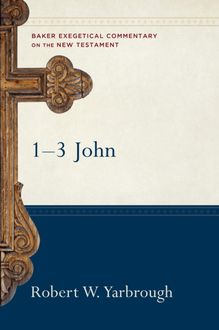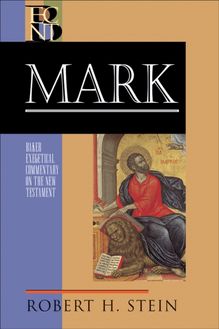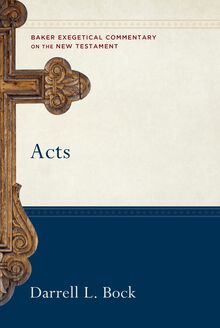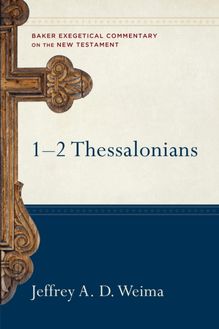-
 Univers
Univers
-
 Ebooks
Ebooks
-
 Livres audio
Livres audio
-
 Presse
Presse
-
 Podcasts
Podcasts
-
 BD
BD
-
 Documents
Documents
-
- Cours
- Révisions
- Ressources pédagogiques
- Sciences de l’éducation
- Manuels scolaires
- Langues
- Travaux de classe
- Annales de BEP
- Etudes supérieures
- Maternelle et primaire
- Fiches de lecture
- Orientation scolaire
- Méthodologie
- Corrigés de devoir
- Annales d’examens et concours
- Annales du bac
- Annales du brevet
- Rapports de stage
La lecture à portée de main
Vous pourrez modifier la taille du texte de cet ouvrage
Découvre YouScribe en t'inscrivant gratuitement
Je m'inscrisLuke : 2 Volumes (Baker Exegetical Commentary on the New Testament) , livre ebook
Découvre YouScribe en t'inscrivant gratuitement
Je m'inscrisEn savoir plus
Vous pourrez modifier la taille du texte de cet ouvrage
En savoir plus

Description
Sujets
Informations
| Publié par | Baker Publishing Group |
| Date de parution | 01 juillet 1996 |
| Nombre de lectures | 0 |
| EAN13 | 9781585583263 |
| Langue | English |
| Poids de l'ouvrage | 3 Mo |
Informations légales : prix de location à la page 0,3119€. Cette information est donnée uniquement à titre indicatif conformément à la législation en vigueur.
Extrait
BAKER EXEGETICAL COMMENTARY ON THE NEW TESTAMENT
ROBERT W. YARBROUGH and JOSHUA W. JIPP, EDITORS
Volumes now available:
Matthew David L. Turner
Mark Robert H. Stein
Luke Darrell L. Bock
Acts Darrell L. Bock
Romans, 2nd ed. Thomas R. Schreiner
1 Corinthians David E. Garland
2 Corinthians George H. Guthrie
Galatians Douglas J. Moo
Ephesians Frank Thielman
Philippians Moisés Silva
Colossians and Philemon G. K. Beale
1–2 Thessalonians Jeffrey A. D. Weima
James Dan G. McCartney
1 Peter Karen H. Jobes
1–3 John Robert W. Yarbrough
Jude and 2 Peter Gene L. Green
Revelation Grant R. Osborne
©1994 by Darrell L. Bock
Published by Baker Academic a division of Baker Publishing Group P.O. Box 6287, Grand Rapids, MI 49516-6287 www.bakeracademic.com
Ebook edition created 2016
Ebook corrections 05.08.2018, 07.02.2020
All rights reserved. No part of this publication may be reproduced, stored in a retrieval system, or transmitted in any form or by any means—for example, electronic, photocopy, recording—without the prior written permission of the publisher. The only exception is brief quotations in printed reviews.
Library of Congress Cataloging-in-Publication Data is on file at the Library of Congress, Washington, DC.
ISBN 978-1-5855-8326-3
With Appreciation
Dave Krentel
William D. Taylor
Harold Hoehner
Don Glenn
Elliott Johnson
Eugene Merrill
Ken Barker
Ed Blum
Stan Toussaint
Howard Hendricks
Don Campbell
I. Howard Marshall
M. Daniel Carroll R.
Scott B. Rae
Craig A. Blaising
It has been a privilege to learn so much from you, and a joy to know the Lord’s fellowship and share in the Lord’s work with you.
Contents
Cover
Series Page
Title Page
Copyright Page
Series Preface
Author’s Preface
Note to the Reader
Abbreviations
Transliteration
Introduction to the Gospel of Luke
I. Luke’s Preface and the Introduction of John and Jesus (1:1–2:52)
A. Preface: Luke Carefully Builds on Precedent (1:1–4)
B. Infancy Narrative: Forerunner and Fulfillment (1:5–2:40)
C. Jesus’ Revelation of His Self-Understanding (2:41–52)
II. Preparation for Ministry: Anointed by God (3:1–4:13)
A. John the Baptist: One Who Goes Before (3:1–20)
B. Jesus: One Who Comes After (3:21–4:13)
III. Galilean Ministry: Revelation of Jesus (4:14–9:50)
A. Overview of Jesus’ Ministry (4:14–44)
B. Gathering of Disciples (5:1–6:16)
C. Jesus’ Teaching (6:17–49)
D. First Movements to Faith and Christological Questions (7:1–8:3)
E. Call to Faith, Christological Revelation, and Questions (8:4–9:17)
F. Christological Confession and Instruction About Discipleship (9:18–50)
IV. Jerusalem Journey: Jewish Rejection and the New Way (9:51–19:44)
A. Blessing of Decision: Privilege, Mission, and Commitment (9:51–10:24)
B. Discipleship: Looking to One’s Neighbor, Jesus, and God (10:25–11:13)
C. Controversies, Corrections, and Calls to Trust (11:14–54)
D. Discipleship: Trusting God (12:1–48)
E. Knowing the Nature of the Time: Israel Turns Away, but Blessing Still Comes (12:49–14:24)
F. Discipleship in the Face of Rejection: Basic Elements (14:25–35)
G. Pursuit of Sinners: Heaven’s Examples (15:1–32)
H. Generosity: Handling Money and Possessions (16:1–31)
I. False Teaching, Forgiveness, and Service (17:1–10)
J. Faithfulness in Looking for the King, the Kingdom, and the Kingdom’s Consummation (17:11–18:8)
K. Humbly Entrusting All to the Father (18:9–30)
L. Turning to Jerusalem: Messianic Power, Personal Transformation, Warning of Responsibility, and Entry with Mourning (18:31–19:44)
V. Jerusalem: The Innocent One Slain and Raised (19:45–24:53)
A. Controversy in Jerusalem (19:45–21:4)
B. Jerusalem’s Destruction and the End (21:5–38)
C. Betrayal and Farewell (22:1–38)
D. Trials and Death of Jesus (22:39–23:56)
E. Resurrection and Ascension of Jesus (24:1–53)
Excursuses
1. John the Baptist and Elijah (1:17)
2. The Census of Quirinius (2:1–2)
3. Date of John the Baptist’s Ministry (3:1–2)
4. Sources and Synoptic Relationships
5. The Genealogies of Matthew and Luke (3:23–38)
6. The Son of Man in Aramaic and in Luke (5:24)
7. The Sermon on the Plain in Luke: Its Relationship to Matthew and Its Theological-Ethical Function (6:20–49)
8. The Parables of Jesus
9. Luke’s “Great Omission” (9:18) from Mark 6:45–8:26
10. Authenticity of the Suffering-Son-of-Man Sayings and of the Passion Predictions (9:22)
11. Last Supper: The Nature and Timing of the Meal (22:7–13)
12. The Jesus Seminar and the Gospel of Luke
Works Cited
Index of Subjects
Index of Authors
Index of Greek Words
Index of Scripture and Other Ancient Writings
Old Testament
New Testament
Old Testament Apocrypha
Old Testament Pseudepigrapha
New Testament Apocrypha
Mishnah
Tosepta
Babylonian Talmud
Jerusalem (Palestinian) Talmud
Targumim
Midrashim
Other Rabbinic Writings
Qumran / Dead Sea Scrolls
Papyri
Josephus
Philo
Classical Writers
Church Fathers
Miscellanea
Notes
About the Author
Back Cover
Series Preface
The chief concern of the Baker Exegetical Commentary on the New Testament (to be known as BECNT) is to provide, within the framework of informed evangelical thought, commentaries that blend scholarly depth with readability, exegetical detail with sensitivity to the whole, attention to critical problems with theological awareness. We hope thereby to attract the interest of a fairly wide audience, from the scholar who is looking for a thoughtful and independent examination of the text to the motivated lay Christian who craves solid but accessible exposition.
Nevertheless, a major purpose is to address the needs of pastors and others who are involved in the preaching and exposition of the Scriptures as the uniquely inspired Word of God. This consideration affects directly the parameters of the series. For example, serious biblical expositors cannot afford to depend on a superficial treatment that avoids the difficult questions, but neither are they interested in encyclopedic commentaries that seek to cover every conceivable issue that may arise. Our aim, therefore, is to focus on those problems that have a direct bearing on the meaning of the text (although selected technical details are treated in the additional notes).
Similarly, a special effort is made to avoid treating exegetical questions for their own sake, that is, in relative isolation from the thrust of the argument as a whole. This effort may involve (at the discretion of the individual contributors) abandoning the verse-by-verse approach in favor of an exposition that focuses on the paragraph as the main unit of thought. In all cases, however, the commentaries will stress the development of the argument and explicitly relate each passage to what precedes and follows it so as to identify its function in context as clearly as possible.
We believe, moreover, that a responsible exegetical commentary must take fully into account the latest scholarly research, regardless of its source. The attempt to do this in the context of a conservative theological tradition presents certain challenges, and in the past the results have not always been commendable. In some cases, evangelicals appear to make use of critical scholarship not for the purpose of genuine interaction but only to dismiss it. In other cases, the interaction glides over into assimilation, theological distinctives are ignored or suppressed, and the end product cannot be differentiated from works that arise from a fundamentally different starting point.
The contributors to this series attempt to avoid these two pitfalls. They do not consider traditional opinions to be sacrosanct, and they are certainly committed to do justice to the biblical text whether or not it supports such opinions. On the other hand, they will not quickly abandon a long-standing view, if there is persuasive evidence in its favor, for the sake of fashionable theories. What is more important, the contributors share a belief in the trustworthiness and essential unity of Scripture. They also consider that the historic formulations of Christian doctrine, such as the ecumenical creeds and many of the documents originating in the sixteenth-century Reformation, arose from a legitimate reading of Scripture, thus providing a proper framework for its further interpretation. No doubt, the use of such a starting point sometimes results in the imposition of a foreign construct on the text, but we deny that it must necessarily do so or that the writers who claim to approach the text without prejudices are invulnerable to the same danger.
Accordingly, we do not consider theological assumptions—from which, in any case, no commentator is free—to be obstacles to biblical interpretation. On the contrary, an exegete who hopes to understand the apostle Paul in a theological vacuum might just as easily try to interpret Aristotle without regard for the philosophical framework of his whole work or without having recourse to those subsequent philosophical categories that make possible a meaningful contextualization of his thought. It must be emphasized, however, that the contributors to the present series come from a variety of theological traditions and that they do not all have identical views with regard to the proper implementation of these general principles. In the end, all that really matters is whether the series succeeds in representing the original text accurately, clearly, and meaningfully to the contemporary reader.
The present commentary on Luke treats matters of detail to a greater extent than will other volumes in the series. Because this is the first commentary to appear on the Gospels, it seemed prudent to give the author some flexibility in discussing source-critical and historical questions (this matter is set in smaller type to distinguish it from the actual exposition of the text; see excursus 4 for additional rationale for assigning this role
-
 Univers
Univers
-
 Ebooks
Ebooks
-
 Livres audio
Livres audio
-
 Presse
Presse
-
 Podcasts
Podcasts
-
 BD
BD
-
 Documents
Documents
-
Jeunesse
-
Littérature
-
Ressources professionnelles
-
Santé et bien-être
-
Savoirs
-
Education
-
Loisirs et hobbies
-
Art, musique et cinéma
-
Actualité et débat de société
-
Jeunesse
-
Littérature
-
Ressources professionnelles
-
Santé et bien-être
-
Savoirs
-
Education
-
Loisirs et hobbies
-
Art, musique et cinéma
-
Actualité et débat de société
-
Actualités
-
Lifestyle
-
Presse jeunesse
-
Presse professionnelle
-
Pratique
-
Presse sportive
-
Presse internationale
-
Culture & Médias
-
Action et Aventures
-
Science-fiction et Fantasy
-
Société
-
Jeunesse
-
Littérature
-
Ressources professionnelles
-
Santé et bien-être
-
Savoirs
-
Education
-
Loisirs et hobbies
-
Art, musique et cinéma
-
Actualité et débat de société
- Cours
- Révisions
- Ressources pédagogiques
- Sciences de l’éducation
- Manuels scolaires
- Langues
- Travaux de classe
- Annales de BEP
- Etudes supérieures
- Maternelle et primaire
- Fiches de lecture
- Orientation scolaire
- Méthodologie
- Corrigés de devoir
- Annales d’examens et concours
- Annales du bac
- Annales du brevet
- Rapports de stage
















